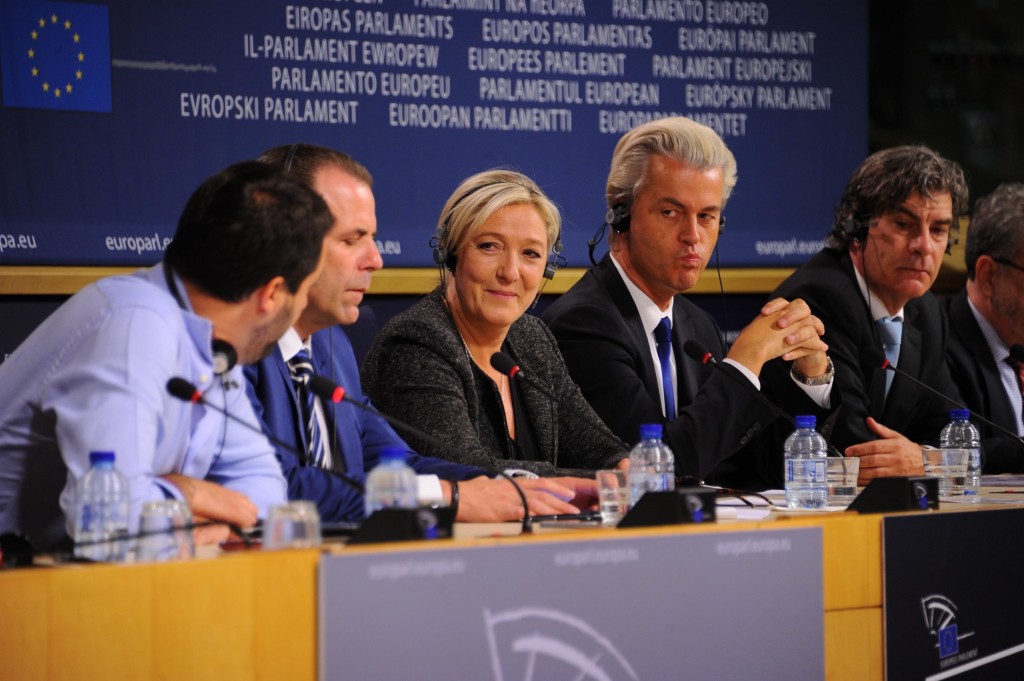On both sides of the Atlantic, courts this week have addressed the relationship of Islam to the west, but with radically different approaches and outcomes. In the US, federal courts in Hawaii and Maryland have halted Donald Trump’s second attempt at a Muslim ban. Meanwhile, the European court of justice, Europe’s highest court, has upheld the right of private employers to ban Muslim women from wearing headscarves.
American and European law each embrace principles of religious neutrality and non-discrimination, but the divergent application of those laws reflects different levels of discomfort with religion generally and a demographic anxiety with Islam in particular.
In both the US and Europe, politicians proselytize about Islam as a mortal threat to western civilization, with high degrees of success. The victory of Trump, the ascendancy of Marine Le Pen in France, and the rightward lurch in the Netherlands – notwithstanding the electoral defeat – of Geert Wilders, provide ample evidence that such populism pays political dividends. And yet, while European courts regulate the veil year after year, American courts by and large have refused to take the anti-Muslim bait.
In a case brought by our clinic and partner organizations, Darweesh v Trump, a federal court in Brooklyn enjoined Trump’s first Muslim ban within 24 hours of going into effect, and a host of federal courts subsequently reached the same conclusion.
In the decisions this week to enjoin the second Muslim ban, the courts have rejected the government’s empty claims that the ban had nothing to do with Muslims. As Judge Derrick Watson wrote in the Hawaii case: “Any reasonable, objective observer would conclude … that the stated secular purpose of the Executive Order is at least secondary to a religious objective of temporarily suspending the entry of Muslims.”
Thus, the court easily identified the government’s national security claim for the ban as pretext for religious animus. The decision represents a continued rejection by the courts of the irrational fear of Muslims – Islamophobia – peddled by the president and his inner circle.
A different reaction in Europe
 In contrast, the decision by the European court of justice reflects an inability of that body to tackle the problem of Islamophobia head-on. Its decision this week upheld the firing of a Belgian receptionist by the multinational security firm G4S because she wore a headscarf.
In contrast, the decision by the European court of justice reflects an inability of that body to tackle the problem of Islamophobia head-on. Its decision this week upheld the firing of a Belgian receptionist by the multinational security firm G4S because she wore a headscarf.
Such an outcome is unfathomable in an American court.
G4S’s Belgian subsidiary – but not the global company – had adopted a policy prohibiting employees from wearing visible signs of religious belief or engaging in religious observance of any kind.
While the policy was written in generic terms, it was no coincidence that the case involved a Muslim woman; it is one of countless such cases across Europe in recent years, from the prohibition on the wearing of burqas in public in France to the banning of headscarves worn by school teachers in Switzerland.
Courts everywhere are in dialogue with the public and as such their decisions are inseparable from the societies in which they are made
Whereas the American courts have seen through the government’s claims of non-discrimination, the European court closed its eyes to the anti-Muslim context in which the G4S policy was adopted.
Courts everywhere are in dialogue with the public and as such their decisions are inseparable from the societies in which they are made. The American and European decisions reflect vastly different societal orientations toward Muslims. In the US, our deeper experience with pluralism of all kinds – racial, ethnic, and religious – has contributed to a repository of resistance to anti-Muslim populism that far exceeds such resistance in Europe.
Religious scapegoats
 To be sure, the United States is far from immune from nationalist impulses or the appeal of Islamophobia – the Trump election proves as much – but the fear of a Muslim takeover of the country finds credence only on the fringe. Even as the Trump administration pushes an easy equation of Muslims, refugees and terrorists, the courts are proving more resistant to religious scapegoating.
To be sure, the United States is far from immune from nationalist impulses or the appeal of Islamophobia – the Trump election proves as much – but the fear of a Muslim takeover of the country finds credence only on the fringe. Even as the Trump administration pushes an easy equation of Muslims, refugees and terrorists, the courts are proving more resistant to religious scapegoating.
In contrast, much of Europe seems beset by anxiety of a Muslim demographic bomb and a loss of European identity. In this context, there is a fixation on the veil as a visible manifestation of alternative cultural practice, and European courts have responded accordingly.
The first Muslim ban in January was greeted by tens of thousands of protesters descending on airports across the country and standing in solidarity with Muslim immigrants and refugees. Many such protesters carried signs bearing an image that populated the Women’s Marches a week prior: a woman in an American flag hijab.
In precisely the same moment that the Trump administration was vilifying the Muslim as a particular object of scorn, protesters exalted the Muslim as a universal object of human rights.
For them, the Muslim was not a threat to the nation, but a stand-in for it, in a way that seems unimaginable in Europe. There have been no massive protests by non-Muslim Europeans in opposition to bans on the veil, no images of France as a woman in a tricolor hijab or of Belgium in a headscarf of black, yellow and gold.
Ironically, even in the age of Trump, when an Islamophobic nationalist has ascended to the highest office of the land, the American courts and public are engaged in a more robust defense of pluralist values than their European counterparts.
The election results in the Netherlands give reason to hope that popular sentiment may be shifting. Perhaps the European courts will be emboldened, and the American courts will continue to hold the line.
Muneer Ahmad
Source: The Guardian
















No Comments